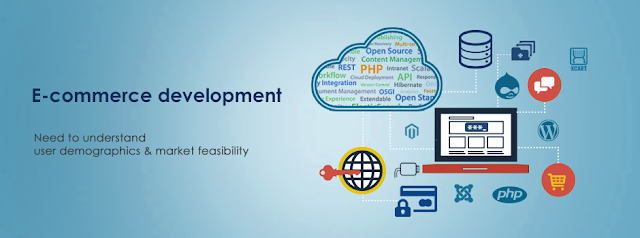Top E-Commerce Platforms to Go for in 2017
The
continually increasing numbers of online shoppers every year,
strongly suggest that e-commerce has literally changed the
conventional ways to buy goods. Today, more than $1 trillion of goods
are being purchased online and getting shipped with the same pace.
The
surprising hike in online purchases went too far in 2013 that it
surpassed the capacity of logistic firms of delivering goods.
Howbeit, the success of eCommerce Web Design & Development Company in USA also bolstered a
cut-throat competition making it harder to win customer’s
satisfaction and experience and easier to lose sales.
In
the event of surviving your eCommerce store among your competitors,
you would need to adhere to the latest technologies as well as a
solid marketing strategy to promote your brand among the targeted
user base. If you too have a great idea for an online store, then
choosing the best platform for your store becomes a crucial and
mull-worthy aspect.
There
are a plenty of platforms to choose from and most of them encompass
their own sets of salient features and cons. We will guide you
through the brief tutorial of each prevailed e-commerce platform and
their advantages and disadvantages for different business ideas.
Once
you get the hint in regard to the best development platform, the next
step is hiring from experienced eCommerceweb development services
Howbeit, despite the level of expertise those eCommerce
web designing companies in USA
claim to have, you would need to do your own side of research to get
an affordable deal, best product, and great support and maintenance.
Let’s see what out there and is the best to help you with your eCommerce project:
1.
Shopify
Boasting
over stunning 325,000 active eCommerce store, Shopify is great for
social and mobile eCommerce purpose. With over 100 store templates
and 1300 extension, it also enables you to connect with various
social media platform on the off chance you decide to generate some
of your revenue from there. Despite all the great features such as
24X7 chat, it might turn out to be a bit expensive than its
alternatives.
2.
Magento
So
far the leader of eCommerce platforms, the Magento holds the largest
share in the most preferred eCommerce platforms. It’s scalable and
grants you with over 9000 plugins, amazing store management library,
and scope for customization. It’s the perfect choice for you if you
are planning something big, an online store that can handle a lot of
products.
3. Big Commerce
Big Commerce is emerging with a precipitated rate and currently hosts over 50,000 eCommerce shops worldwide. If you lack technical expertise, it’s
the finest choice for you. It comes with some cool built in features
that save you from a lot of headache and work. Newsletter, analytic,
coupons, and much more, it’s all there.
4. Yo Kart
A
comprehensive framework to handle multiple vendors, Yo Kart, in spite
of being new to the race is catching its pace efficiently. Who
wouldn’t like 12 months of free support for store management or
having his doubts cleared through content-rich video tutorials and
FAQs? However, there are no third-party extensions currently
available but it’s advanced version costing one-time charge of $999
comes with great customization features and is worth considering.
Resource of the previous Blog :- Previous
Our Website:- http://www.webhonchoz.com/
For more info please go on to our social profiles :-
Facebook- https://www.facebook.com/webhonchoz/
Linkedin - https://www.linkedin.com/company/webhonchoz
Twitter - https://twitter.com/webhonchoz
Youtube - https://www.youtube.com/channel/UCXUrdP7mtRieb5wXf1j4pYA
Google Plus - https://plus.google.com/115611065038105638939
For more info please go on to our social profiles :-
Facebook- https://www.facebook.com/webhonchoz/
Linkedin - https://www.linkedin.com/company/webhonchoz
Twitter - https://twitter.com/webhonchoz
Youtube - https://www.youtube.com/channel/UCXUrdP7mtRieb5wXf1j4pYA
Google Plus - https://plus.google.com/115611065038105638939



Comments
Post a Comment